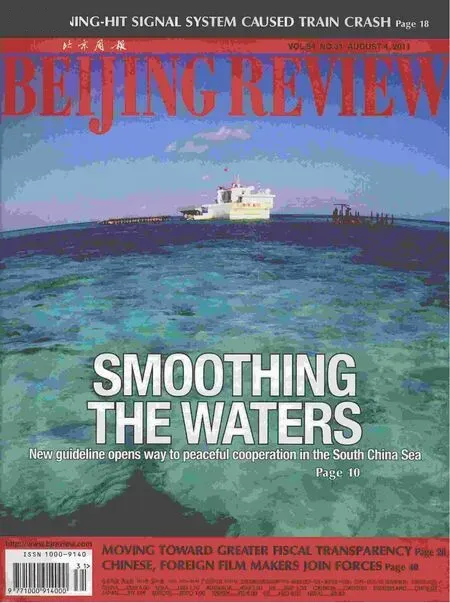A New Dawn For NGOs
By YIN PUMIN
A New Dawn For NGOs
By YIN PUMIN
Registration requirements relaxed for charity work

WANG hAOMING
After years of expectation, a number of NGOs in China welcomed the good news government approval will soon become easier.
On July 4, Minister of Civil Affairs Li Liguo announced independent non-profit organizations working in the felds of charity, social welfare and social services would be able to register directly with civil affairs departments. Previously NGOs had to fnd a government supervisory body before registering.
The ministry has also revised regulations regarding NGO registration, foundation management and the registration of private nonenterprise units.
“While the government will continue to supervise NGOs it will reduce the role it plays in their internal affairs,” said Deng Guosheng, Director of the Center for Innovation and Social Responsibility (CISR) at Tsinghua University.
Longstanding obstacles
A number of Chinese NGOs have emerged in recent years. As of the end of 2010 China had a total of 440,000 registered social organizations; 243,000 social groups, 195,000 private non-enterprise units and more than 2,600 foundations.
“Today’s China is undergoing tremendous changes in its social structure. With the country becoming more diversified and modernized, it is diffcult for the government to effectively solve all social problems and the participation of NGOs is necessary,” said Kang Xiaoguang, Director of the Non-Proft Organization Research Center of Renmin University of China.
Currently NGOs play an important role in the felds of poverty alleviation, environmental protection, cultural education and disaster relief. For example, more than 400 NGOs are involved in work concerning the prevention and control of AIDS. And, following the devastating 8.0-magnitude Wenchuan earthquake in southwest China’s Sichuan Province in 2008, many NGOs played an active role in collecting funds and supplies, offering psychological help, and taking part in the reconstruction work.
“Meanwhile, in addition to providing social services, NGOs can advocate ideas and theories that infuence public opinion and government decisions,” Kang said.
He Daofeng, Deputy Director of the China Foundation for Poverty Alleviation, defnes NGOs as assistants to the government. “They provide a platform for ordinary people to solve their own problems by themselves. With the help of NGOs, the government can reduce its role to being a rule maker and arbitrator in disputes,” he said.
China’s NGOs have long faced diffculties registering and receiving government approval. Yu Keping, Director of the China Center for Government Innovation of Peking University, said about 3 million social organizations remained unregistered with the government at the end of last year, which means almost 90 percent of the organizations therefore were technically illegal.
Current regulations stipulate social organizations must fnd a government department or agency to be their supervisory body before they register with civil affairs departments.
But many social organizations said most government agencies were reluctant to take responsibility for supervising non-proft organizations, which had left many NGOs in a legal limbo. Without offcial approval NGOs are unable to enjoy tax breaks, apply for government projects or legally solicit public donations.
As a result of the difficulties they face in obtaining approval, some NGOs have chosen to register as enterprises with the authorities for industry and commerce and pay taxes. The Beijing Stars and Rain Education Institute for Autistic Children, a non-profit organization, for example, was founded in 1993 and has long been an enterprise registered at the Beijing Administration for Industry and Commerce. But this has remarkably increased its fnancial burden.
Breaking the ice
As there has been a steep increase in the number of independent non-proft organizations working in communities, some local governments have already drawn up new regulations to make their registration easier.
In September 2008, Shenzhen in south China’s Guangdong Province adopted a policy that allows NGOs in the felds of social welfare and charity to register directly with civil affairs departments after passing a set of pre-approval requirements.
“We have seen how some organizations have been bottlenecked in their development and are looking at tackling some of the systemic difficulties in moving from a dual management system to direct registration,” said Ma Hong, Director of the Social Organization Administration Offce under the Shenzhen Municipal Bureau of Civil Affairs.
Ma said the requirements are an NGO applying to be registered should have a regular operating location, full-time staff members and at least 30,000 yuan ($4,392) in registered capital.
In July 2009 the Shenzhen Municipal Government was granted the power to approve the creation of public fundraising foundations. In the past, only the Ministry of Civil Affairs had this authority.
Thanks to this new policy, the One Foundation, which was founded by Hong Kong movie star Jet Li, ended its cooperation with the Red Cross Society of China and registered as an independent public fundraising foundation in Shenzhen in January this year.
“It’s a cornerstone of China’s charity development,” Deng said. “For the frst time, we have seen the successful transition of a private charity attached to a public organization into a formal public foundation.”

ChEN XIAOGEN
Since its establishment in 2007, the One Foundation had been running as a private charitable project under the Red Cross Society of China and encountered legal problems when it tried to fundraise as an independent organization.
In February 2010, Beijing also amended its regulations to allow social organizations in Zhongguancun Science Park to register directly.
In February this year, the new policy was extended to the whole city, allowing social organizations operating in the felds of charity, welfare and social services to register directly with civil affairs departments.
Now the Ministry of Civil Affairs is determined to expand the direct registration policy to the whole country. On July 8 the ministry issued draft guidelines in which it pledged to provide preferential tax treatment to individuals, enterprises and organizations that make charity donations.
“This is a good sign and refects the fact that the government attaches great importance to existing problems and is willing to solve them,” Deng said. But he added NGOs are still underdeveloped in China.
“China has witnessed rapid growth in the number of NGOs since the middle of the 1990s,” Deng said. “But compared with some developed countries, especially the United States, we lag far behind in terms of scale and capabilities.”
There have also been extensive complaints about the fact government-associated NGOs in China have a virtual monopoly of resources for charitable programs, such as funding, while NGOs without government backing have limited support and are unable to benefit from favorable government policies.
Staff workers at government-associated organizations are widely blamed for lacking incentive to carry out public service, as their salaries remain the same however well they perform. But a large number of NGOs created by individual citizens or businesses are often unable to meet social needs due to a lack of support and funding.
“We need both reform and development,” Deng said. “A competitive mechanism should be introduced to help break the monopoly while more support should go to grassroots organizations.”
“The government should cultivate more talented people for the development of NGOs while the public needs to become more aware of the importance of NGOs and support their development by donating money and materials and serving as volunteers. Spreading the spirit of volunteerism and supervising the performance of NGOs are the government’s role,” Kang said.

